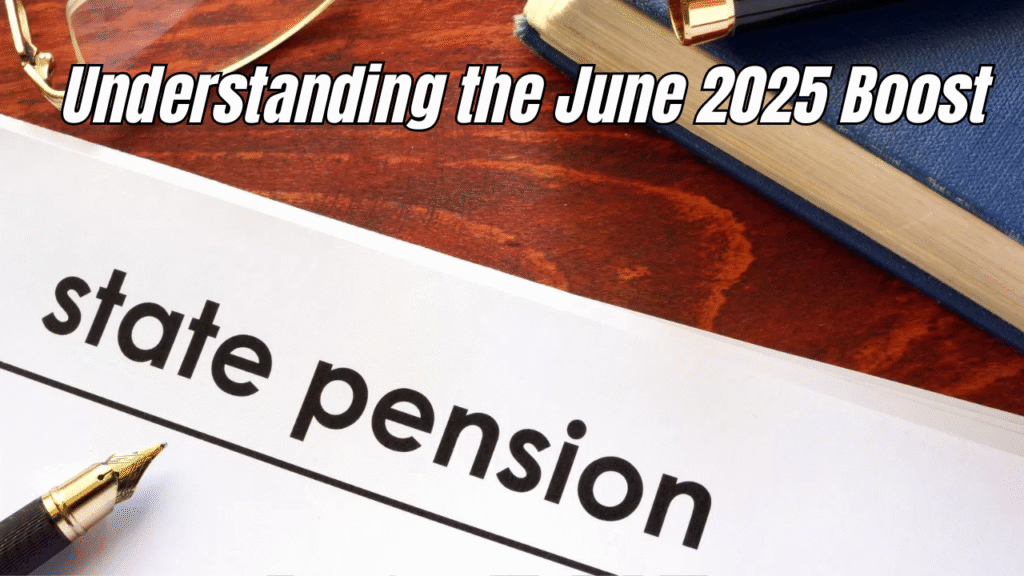1. Introduction
Millions of UK pensioners are in for good news this summer. Starting June 2025, eligible retirees will see a £221.20 boost to their State Pension payments, part of a broader commitment by the UK government to support older citizens through rising inflation and living costs.
This article unpacks who qualifies, how much you’ll get, when to expect it, and how it fits into broader pension policies such as the Triple Lock.
2. What Is the UK State Pension?
The State Pension is a regular income paid by the UK government to individuals who’ve reached State Pension age and contributed enough National Insurance (NI). It forms a critical pillar of financial support in retirement.
Two main types:
- Basic State Pension: For those who reached retirement before April 6, 2016.
- New State Pension: For those who reached retirement age on or after that date.

3. Understanding the June 2025 Boost: Why £221.20?
The £221.20 amount reflects:
- Triple Lock Guarantee application
- Cost of living increases
- Annual uprating of pensions based on the higher of:
- Inflation
- Average wage growth
- 2.5%
This is not an extra lump sum, but an increase in the weekly amount, which can total a boost of over £860 annually.
4. Breakdown of State Pension Increase
Here’s how the figures break down:
| Category | Weekly Rate Before | Weekly Rate After | Increase |
|---|---|---|---|
| New Full State Pension | £203.85 | £221.20 | £17.35 |
| Basic State Pension | £156.20 | £169.50 (est.) | £13.30 |
This June 2025 uplift will be reflected in the first full payment issued after implementation.
5. Eligibility Criteria for June 2025 Boost
To receive the new rate:
- You must be State Pension age (currently 66)
- You must have paid or been credited with:
- 10 qualifying years to get anything
- 35 qualifying years to get the full new State Pension
- You must have claimed your pension
- You should reside in the UK or eligible overseas locations
6. Full New State Pension vs. Basic State Pension
| Factor | New State Pension | Basic State Pension |
|---|---|---|
| Applies to | Retirements from April 6, 2016 | Retirements before April 6, 2016 |
| Max Weekly | £221.20 | ~£169.50 |
| Years Needed | 35 | 30 |
| Based on NI? | Yes | Yes |
Both categories benefit from the increase, though the amounts differ.

7. How to Check If You Qualify for the £221.20 Boost
Follow these steps:
- Log in to your personal tax account at gov.uk
- Go to “Check your State Pension”
- Review:
- Entitlement
- Weekly rate
- National Insurance record
If underpaid, request a NI contribution top-up.
8. How the Triple Lock System Impacts the Increase
The Triple Lock ensures your pension rises by the highest of:
- Consumer Price Index (CPI) inflation (Sep 2024 figure)
- Average wage growth (July 2024 report)
- 2.5%
For 2025, wage growth led the increase, meaning the £221.20 boost follows that metric.
9. Impact on Pensioners with Additional Benefits
Higher pensions may affect:
- Pension Credit eligibility
- Council tax reduction
- Housing benefit thresholds
- Free prescriptions (in some parts of the UK)
However, for most low-income pensioners, the increase is still beneficial.
10. Tax Implications of Higher Pension Payments
State Pension is taxable, but:
- You pay tax only if your total income exceeds £12,570/year (Personal Allowance)
- If you have private or workplace pensions, this increase may push you into a taxable bracket
Keep an eye on your total income and HMRC coding notices.
11. Payment Dates for June 2025 Boost
Payments depend on your NI number:
| Last Two Digits of NI | Payment Day |
|---|---|
| 00–19 | Monday |
| 20–39 | Tuesday |
| 40–59 | Wednesday |
| 60–79 | Thursday |
| 80–99 | Friday |
The first boosted payments are expected to begin between June 2–6, 2025.
12. How Much You’ll Receive Based on Your NI Record
| NI Years | Estimated Weekly Pension |
|---|---|
| 10 | ~£63.20 |
| 20 | ~£126.80 |
| 30 | ~£189.00 |
| 35 (full) | £221.20 |
Note: You can purchase additional years to fill gaps for full entitlement.
13. What to Do If You Don’t See the Boost in Your Account
You should:
- Wait up to 5 business days
- Check your bank statement and pension letter
- Use DWP’s online tracker or call their helpline
- Raise a complaint if needed via Pensions Service
14. Role of Deferrals and Late Retirement
If you defer:
- You don’t receive the boost immediately
- Your pension grows by 1% for every 9 weeks deferred
If you begin claiming in June 2025, you will receive the new higher rate from day one.
15. How to Ensure You Get the Full Boost
✅ Check your NI contribution years
✅ Top up missing years before age 66 (deadline: April 2025)
✅ Claim your pension if eligible
✅ Update DWP with address and banking details
✅ Check your pension forecast annually
16. Changes in the Cost of Living and Pension Reforms
- The UK’s cost-of-living crisis has driven the need for stronger social support
- State Pension boosts help offset rising energy, food, and healthcare costs
- There’s ongoing debate about retirement age increases, NI reforms, and future of the Triple Lock
17. Historical Comparisons: 2022–2025 Trends
| Year | Weekly Rate | Annual Total |
|---|---|---|
| 2022 | £185.15 | £9,627.80 |
| 2023 | £203.85 | £10,600.20 |
| 2024 | £211.55 | £11,001.60 |
| 2025 | £221.20 | £11,502.40 |
Cumulatively, pensioners have gained nearly £2,000 per year since 2022.
18. Conclusion
The £221.20 State Pension boost in June 2025 is a powerful step in helping retirees stay financially secure amid economic uncertainty. Whether you’re already claiming or approaching retirement, it’s vital to understand your entitlements, check your NI contributions, and claim your benefits on time.
This boost isn’t just about more money — it’s about dignity in later life, and every pound counts. Make sure you’re not missing out.
19. FAQs
1. Who qualifies for the £221.20 State Pension boost?
Anyone receiving the new State Pension and with 35 years of NI contributions by June 2025.
2. Is the £221.20 a one-time payment?
No, it’s the new weekly amount after the 2025 uprating — totalling over £11,500 per year.
3. What if I only have 20 years of contributions?
You’ll get a pro-rata amount, approximately £126.80 per week.
4. Will the increase affect my tax status?
Only if your total income exceeds £12,570, in which case you may pay tax on the surplus.
5. When will I receive my first increased payment?
Most will see the boost reflected in their June 2025 payment, depending on NI number and pay schedule.


